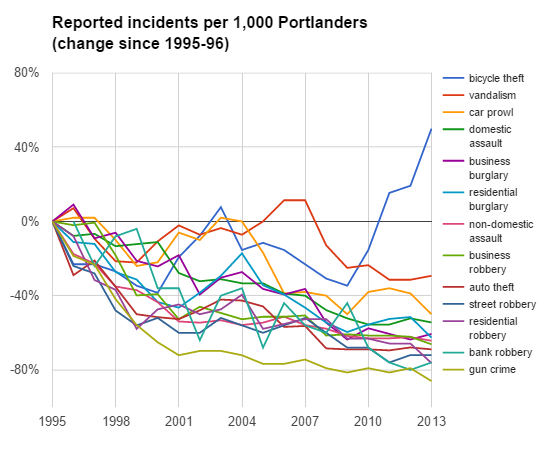
Like most cities in the developed world, Portland is a dramatically more secure place than it was in 1995.
Reported residential burglaries per resident are down 63 percent. Auto theft is down 69 pecent. Gun crime is down 86 percent.
But 20 years of Portland crime statistics collected Wednesday on Portland State University’s website showed that there’s a single glaring exception: bike theft. It’s up 50 percent since 1995.
Maybe more alarmingly, bike theft was falling too until it soared 130 percent starting in 2009 — which was also the year Portland’s celebrated spike in bike commuting leveled off. This suggests that the spike in bike theft is related to something other than just the number of bicycles around.
The cost of bike thefts, of course, fall mostly on the subset of Portlanders who own and regularly use bikes, maybe 20 to 30 percent of the city’s population.
According to the data from PSU’s Criminal Justice Police Research Institute, 2,307 bikes were reported stolen from Portlanders in 2013, the most recent year tallied here.
That’s 40 bikes per 1,000 Portlanders, or a little less than half the residential burglary rate in 1995 — a time when urban crime was one of the hottest issues in the country and President Clinton’s crime bill dominated the national conversation.
The cost of bike thefts, of course, fall mostly on the subset of Portlanders who own and regularly use bikes, maybe 20 to 30 percent of the city’s population.
Bike theft victims in 2013 included Portland Bureau of Transportation Director Leah Treat. Last year, City Commissioner Nick Fish “joined the club,” as he put it in a Facebook post.
The PSU visualizations show that the spike in bike thefts has been almost universal across the city. Here’s a map of where bike theft has gotten worse, with the biggest increases over the last 10 years marked in the deepest red:
For comparison’s sake, here’s a look at residential burglary trends over the same period:
And car thefts:
PSU has even made a series of animated GIFs that show the worst locations for each of these crimes over time. Here’s the one for bike theft, which shows how it was mostly a central-city phenomenon until 2008, and burst citywide in 2012 and 2013.
The huge spike in reported bike theft isn’t a surprise in itself, at least to regular BikePortland readers. We reported last December that incidents were up sharply in 2013 and 2014, according to a bike theft trend report from the Portland Police Bureau. (For some reason, the numbers it uses are a little different than the ones used by PSU, but the trend is similar.)
What the PSU numbers show, however, is how dramatically bike theft has increased while every other category of crime fell by 30 percent or more.
Advertisement
Here at BikePortland, we’ve been responding to this problem directly by partnering with the Bike Index anti-theft service to host a Portland Bike Theft Summit, which brought in more terrific partners and has led to the PPB creating a Bike Theft Task Force.
In our Bike Theft Chronicles series, we’ve shared stories like the time a thief snapped a sign off a 10-foot-tall pole to thread the bike over the top (six months ago) or the week someone went around town sawing through bike staples (four months ago).
A #bikethief in #pdx sawed through staple rack on Morrison/SE 7th & stole a Trek Lexa S https://t.co/6DMLhnzXeA pic.twitter.com/XdhhH4VN0g
— BikeIndex Portland (@stolenbikereg) January 5, 2015
We’ve reported on Lake Oswego police detectives tracing stolen bikes to a major bike-fencing operation operating semi-openly out of two downtown buildings.
Another story came across my screen yesterday.
Cameron Whitten, a well-known social justice advocate in Portland, had parked his bike outside the First Unitarian Church in downtown’s west end on Tuesday night, from about 7 to 9 p.m. Some time in that period, someone apparently managed to detach a blue bike staple from the sidewalk and make off with this bicycle:
I called the church Wednesday morning to get their take.
“They unbolted it from the ground, picked it up, left the rack and then they just took the bike,” said Jason Chapman, the church facilities manager. “It’s kind of like recessed a little bit, you’re further back from the street. But if you’re in a car and you looked over, you’d see it.”
“We’ll reinstall the thing and I’m thinking I might weld the bolts to the rack so they can’t be unscrewed,” Chapman added. “I’m not sure what else I can do. I can probably put a camera out there. Maybe I will do that.”
Whitten, for his part, was sad.
“He was a good bike,” he wrote on Facebook. “Won’t have the funds to replace him for a while.”
I hope and expect Whitten (a friend) will eventually be able to find his way back onto a bike even if his isn’t recovered. But that won’t change the awfulness of this theft or the thousands like it. And it doesn’t change maybe the most depressing fact in all of bike theft: 7 percent of victims never replace their bikes.



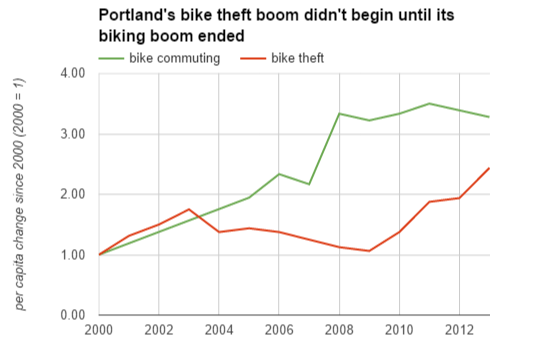
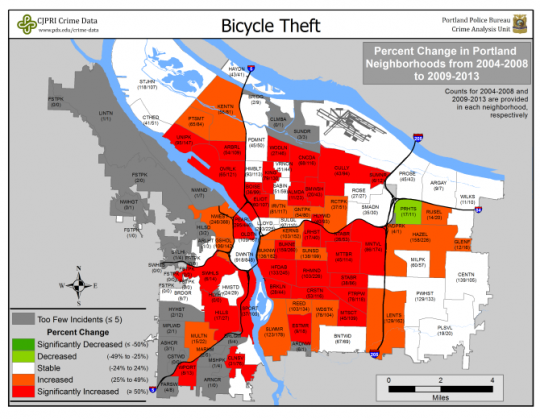
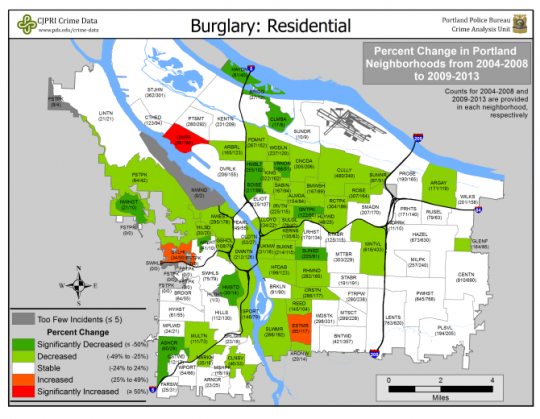
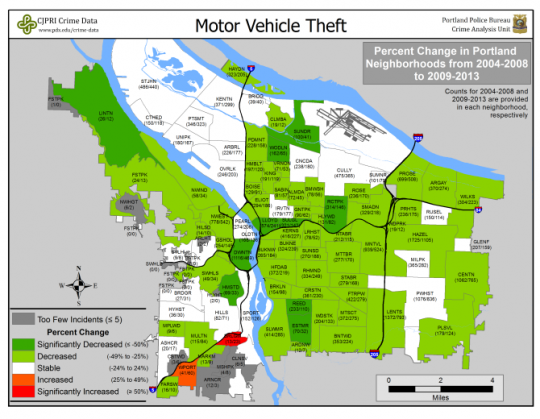
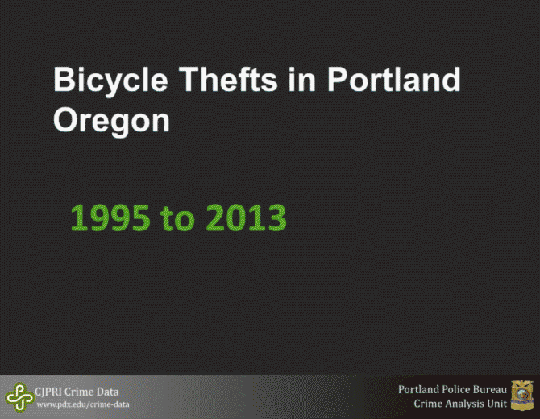

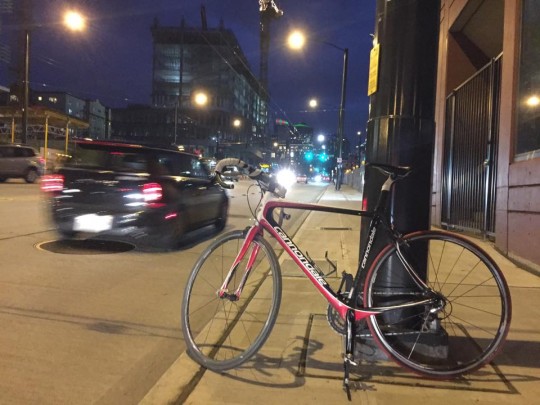

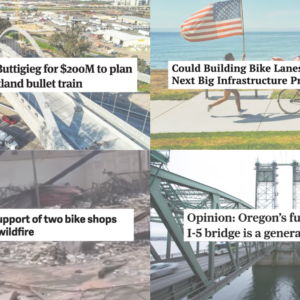

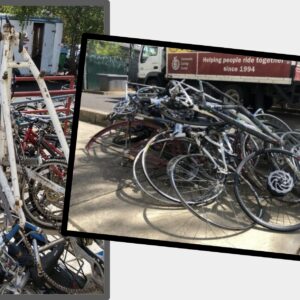
Thanks for reading.
BikePortland has served this community with independent community journalism since 2005. We rely on subscriptions from readers like you to survive. Your financial support is vital in keeping this valuable resource alive and well.
Please subscribe today to strengthen and expand our work.
As long as the city does nothing about homeless camps that openly double as stolen bike chop shops, and the county justice system matrixes thieves out of jail after two hours, this trend will continue.
Well there’s hope then George. Because the city is definitely doing something about that issue. Our Bike Theft Task Force Core Team is meeting with Multnomah County DA’s next week to put our heads together from an enforcement point of view and the PPB is learning and figuring out how to better work with and deal with people who are stealing bikes and parting them out. Stay tuned.
I sure hope they’re going to do something! I pass the ridiculously huge camps at Water/Madison every day, and the thieves have gone right back to operating right on everyone’s faces. In the last few weeks,I’ve seen Leroy Parsons riding three different (presumably stolen) bikes.
Homelessness and bike theft have increased at the same time. See the connection? We now live in one of the most unequal Western countries and the opportunity for anyone to lift themselves up out of the poverty they were born into is slim at best. Our cheap band-aid solution is more Orwellian surveillance- which may help. We’ve privatized some prisons but we still have to pay for police to make arrests and the justice system to send folks to jail. Should we hope for a privatized police force, like Robocop, or should we look to decrease homelessness? The Horatio Alger myth is long dead now, along with the funding for social programs that used to help relieve this terrible tragedy.
I agree, but remember that just because we privatize the police force or the prison system doesn’t mean the taxpayer won’t be paying for them. Using Xe (Blackwater) to fight our wars for us still costs you and I plenty of money, it’s just at the backend, profits are squeezed out and paid to shareholders of those corporations.
I don’t disagree with the larger point, J, but what homelessness numbers are you looking at? Homelessness in Portland has been rising relatively steadily since 2009, but at nowhere close to these rates.
I’m not sure the numbers need to correspond exactly because each thief needs to steal more than one one bike each month to survive (and possibly afford their self-medicating substance). How many bikes does the average thief steal each year? I don’t have the answer to that either, but statistics have shortcomings regarding perspective to the overall picture.
increases since 2009 are modest and recent city measures of homelessness are lower than they were in the early 2000s. there is essentially no correlation between the prevalence of homelessness and bike theft.
I don’t know about a correlation between homeless count and bike theft count. But I suspect a correlation between homeless camp bike chop shop count and bike theft count.
Honestly, I have never understood why there are such obstacles to wiping out the chop shops along the Springwater Corridor. It must be illegal to store private property in those public properties. If it isn’t, write the ordinance and make it so. Then all the piles of bikes and parts can be scooped up with a Bobcat and hauled off with no more legal complication than picking up litter. No need to prove anything is stolen, if its simple presence there is a violation.
Can someone enlighten me about this?
I’m guessing the federal civil rights consent decree. I suspect the justice department would frown on more beatings, maimings, and extrajudicial killings.
I’ve had 5 bikes stolen but I have terminal compassion fatigue when it comes to bike theft.
As I read this I realized I have serious compassion fatigue.
(Meaning J’s 10:41 comment. And not proud of it, by the way–it’s just a fact)
Latest word it that the homeless camp “right to dream” will become institutionalized at the east end of the new Tilicum bridge. Instead of a erupting into a frothy rant now, I will just wait until BP issues that article and my thoughts are fully composed.
That’s actually the homeless camp you should be least worried about. If its occupants are engaged in illegal activities, they will be outside of the camp itself.
I agree Right to dream is the solution not the problem. Just go ask the business around the current location. I do not draw a clear line between homelessness and bike theft. I hold the lack of prosecution responsible for the growth of bike theft.
A semi-sanctioned homeless tent city is not a solution, it’s a ghetto for the mentally ill.
Bike theft is one sign of having a healthy bicycle culture. Still sucks though.
Exactly! Amsterdam is probably the worst place in the world for bike thievery. I have a Dutch friend who used to live close to downtown Amsterdam and lost several bikes.
What about the crime of hit-and-runs? Some go unreported.
We used to tell people, “Police reports show hardly any examples of bikes being stolen after having been locked with a u-lock to a secure object. There’s no sense in buying a high-end u-lock in this town because thieves don’t even mess with the cheap ones. As long as you’re not using a cable lock, you should be fine.” …and it used to be true.
True – but how many thefts involve destruction/removal of staples and the like? These are incredibly disheartening thefts for cyclist, but I would be surprised if more than 5% of thefts involve the thief disabling or destroying the anchor point.
Sure. If your bike gets stolen in this town, it’s still probably because:
– you didn’t lock it
– you used a cable lock
– you locked it to something that wasn’t secure
But there are now examples of u-locks being defeated. That’s new.
It’s almost like Portland is a city!
Or, you used a U-lock improperly. I see this all the time. Just the front wheel or seatpost locked without actually putting the U-lock through the frame. Having the most awesome lock in the world is pointless if you don’t use it correctly.
Looking at the excellent PSU Bike Theft hotspot map by year… I was also trying to see if the “ball point pen as Kryptonite key” era added to the theft increases after it became public…but could not see a big boom…unless it became an issue later as these locks trickled down to poorer users or the knowledge about how to defeat the lock became more widespread. I was surprised the other day when a middle aged co-worker who commutes by bike was using such a lock and she did not know about it.
An ounce of prevention is worth a pound of cure, right?
U-Locks, U-locks, U-locks!
And . . . more secure indoor bike parking . . . employers, landlords, retailers, take notice!
Hello, U-lock. Meet Mr. Crowbar.
Bike lockers.
Bravo!! I can’t tell you how many places I’ve tried to get city council to allow a local (bay area) business to get lockers put into, and there’s definitely demand for this. Levi’s Stadium, Earthquakes Stadium, Caltrain – so many places around here have the space for this but don’t prioritize it. My wife’s hospital (Kaiser) has quite a few lockers, though, and they were instrumental to getting a whole bunch of people to start commuting by bike. Also a Chase bank went up recently near my house, and I noticed it has two bike lockers out front (I assume for employees, though wonder if they actually get used).
Incredibly simple solution with a good deal of market value, I’d imagine.
Yeah, they get $180 a year out of me for about 8 square feet of space that can’t be used for anything else. But it’s worth it knowing I have a safe, dry space to store my bike and bike gear. Don’t have to worry about stuff like having my seatpost stolen, as happened to a coworker of mine last week.
I found a section of the U from a U-lock on the sidewalk recently. It had obviously been cut with a set of bolt cutters. Check youtube for lots of videos on cutting U-locks with $20 Harbor Freight tools. U-locks are better than cables, but are clearly not secure.
Is the increase possibly just a reporting issue? In other words, are the number of thefts not dramatically different, but that people are reporting it to the police more often? I have no idea if this is actually the case, but perhaps pre-2009, people assumed nothing could be done. At some point, word got out that occasionally you do get your bike back if you report it (perhaps a story from here on BP?). Jonathan, any meta-analysis of the reporting data?
How did Parkrose buck the trend and be the only neighborhood to decrease bike theft?
I live out there. Nobody bikes…except me.
My neighborhood stayed “neutral”. But if you look at the fine print “neutral” is = +/- 25%!
Bike theft has gone up, but so has the rate of cycling and bicycle ownership in general. It would make more sense to see what percentage of bikes were stolen versus percentage of people who had bikes stolen. The increase could be a false trend. Either way, there is a special place in hell reserved for bike thieves.
That’s true, mcquain. But as the post says, the spike in bike theft happened *after* Portland’s bike boom ended.
You could theorize that it took professional and semi-pro thieves a few years to realize how easy and lucrative bike thefts were and to create organized processes to take advantage of them … but that’d actually be a really different situation than a world where there are just a bunch of new targets of opportunity.
It’s not just that there are more bikes.
Isn’ Portland’s “bike boom” just based on self-reported commuter numbers (census data, right?)?
There could be more people with bikes or buying bikes that just don’t fill out the “I commute a majority of time by bike” box on the census.
Well, the same trend shows up in the city bike counts, the annual auditor’s survey, the number and sales trends of bike shops in town … not saying there’s been no growth in occasional and recreational use but if so it’s not showing up on anything measurable.
One key question here is how much more a bike is at risk of theft if it’s being used frequently. My guess is a lot, but I’m not actually sure.
Okay, just wasn’t sure what data people are basing their “bike boom” on.
The gas price spikes of 2006?
Definitely part of it but doesn’t explain the booms in NYC or DC (started in 2008 as gas prices collapsed), or other cities’ lack of a boom in 2006.
Thieves steal anything that there exists a market for. The big question is what is happening to these stolen bikes? Who is buying them, or their parts? Maybe part of the bike theft solution is try to address the trade in used bike parts? Where to start, though…?
Not sure that the total number of bikes owned in Portland has increased…there have always been a lot of bikes in cities but they are now being ridden. The latter is key…assuming that a ridden bike is one that if stolen would be reported and one just collecting dust in a garage might not be reported.
It depends on whether you count all the bikes owned by the houseless population along the river and paths and being serviced by their “mobile repair shops” or under the blue tarps in their “valet bike parking” areas.
mcquain has it right. Incidents per 1000 residents isn’t a great measure if the number of residents with bikes is changing. If we use commute mode share as a proxy for the number of residents with bikes that could be stolen, then from 1995 to present, that number would increase 700% (roughly 1% mode share two decades ago to 7% today) while thefts increased 50%… really, that’d be a massive decrease in the theft rate. I’m sure the actual numbers are different, but that estimate is probably better the measure presented in the graph that leads the article.
You make some good points, Elliot (as I just wrote to mcquain above) but you should look at the timing. I just added this chart to the post to make the timing of this trend clearer.
Michael, aren’t the trend lines converging back as they were in 2003? You could say the 04-08 drop in theft was the anomaly, not the rise since 2009.
Good way of thinking about it! The thing for me is that if there’s a lag, that suggests people (presumably a pretty small number of people) are becoming bike theives consciously and systematically, presumably because bikes are so easy to steal, so hard to trace and so easy to resell.
If I were going to try to make money by stealing things in this town, I’d probably pick bikes too. Fortunately, almost nobody actually tries to make money as a thief. I am theorizing that the scale of any organized/systematic criminal operation is so small that when it arises (as it apparently has) it can actually be addressed by good detective work and enforcement.
Luckily it sounds like the detective work and enforcement is coming on line more and more by the day!
Elliot does have a good point. That chart looks to me like the number of thefts relative to the number of commuters has gone down over time.
Shutting down the couple of known chop-shops is all you really need to do to stop this trend.
Two years ago in Austin Texas somebody noticed 1 -just 1- such chop shop. Reported it to police, and then police shut it down and bike thefts decreased by 50% the next month!
Story – http://www.kvue.com/story/news/2014/05/22/2356558/
We know where these crimes are occurring and by whom, just shut down these few dealers and there will be nobody paying for these obviously stolen bikes, which means there’s less incentive for people to commit the crimes in the first place.
Absolutely. As long as there is demand, the bike thieves will find a way. This problem is not about better locks and better racks. We need to quash the problem at the source.
Anyone ever notice what appears to be a floating chop shop in the Willamette? There is what looks like an old boat attached to a raft, on the east side a bit south of the Steel Bridge. I often see piles of bikes on there, with no effort to hide them. Hard to imagine this being a legal situation.
Yeah, that’s this guy: http://www.wweek.com/portland/blog-28772-hobo_pirates_of_the_.html
He always has frames, parts, etc. and is a fixture around the chops in that area
hello I have seen something like this it sits at the Hawthone bridge on the southwest side I saw tons of bikes piled up and tried to report it.
And how about we drop the attitude that because you are down on your luck, it’s okay to victimize somebody else?
I’m fine with that, just so there’s any actual chance of down-on-their-luck people getting to be up-on-their-luck. Unfortunately, I don’t see that happening.
I think most of us can probably agree we’re not talking about someone lifting a loaf of bread to feed their starving family. This is a different situation entirely.
… and now would be an EXCELLENT time to remind people that Portland Police are actually seizing/recovering tons of bikes all the time – but get stuck having to auction them off because they can’t find the owners.
Please please please go register your bikes over at http://www.BikeIndex.org – it’s free, fast, and we’ve got a tight relationship with all the entities here in Portland that recover bikes so we can ID them and get them back to the owners.
-B
A zero consequence crime is functionally equivalent to the government saying that the act is no longer criminal.
Maybe bicycle theft would get more respect if it was filed as “property theft” with no mention of the word “bicycle”.
Yep…its the “B” word. It always works against us…
Low level property theft is hardly a law enforcement priority in Portland.
Wallets and credit cards are a frequent property crime target.
The credit limit of the average person is lower than the price of some mid to high end bikes.
Guess which one is prosecuted consistently no matter the dollar amount stolen.
Have a thousand dollars of tools stolen out of your truck, and see what level of priority PPB gives the case.
The Multnomah County AG prosecutes low-level credit card theft? Really?
The problem is that Multnomah County AG has basically stopped prosecuting low-level property crimes. Remarkably, criminals have figured this out…
Oops… I meant Multnomah County DA.
So…according to this graph, in 1995, every type of crime happened exactly once in 1000 residents? I know that’s not the point, but…really? Just saying…
Good question – as noted in its title, the graph shows only the *change* since 1995 (or in the case of bank robberies the change since 96 because there’s no 95 data). Whatever the 1995/96 level was, we set that to 1.
This is a pretty common data visualization method in this situation (it’s how the feds express inflation, for example) and it’s because car thefts are just always going to be way more common than shootings. If we hadn’t done this the chart would have looked like a meaningless tangle, though it still would have shown the same trends for someone looking hard enough.
It is the crime statistics equivalent to “parts per million” in chemistry when representing a proportional part of the whole.
I know if any business or other institution would allow bikes inside, they’d get a lot of support.
I went to the US Post Office in the Alphabet District today, for the first time. Big sign on the door said “No Bikes in Lobby.” I didn’t notice any nearby bike racks, either. Odd.
I work in a secured yard and I lock my bike up inside that yard. Most theft comes from opportunity, the day I would not lock, walk out and my bike was gone regardless of the gated entrance is the day I kick myself.
It is the path of least resistance, an unlocked bike is an easy target, i remember a mentor in my BMX days telling me to keep my bike connected to my arm.
It is sad but true, all it takes is a cordless impact or sawzall and no matter what your ride is gone, that is the top of the chart though, unlock, cablelock, chainlock, street sign or thin staple will all happen before ulock and gas meter.
As stated above, eliminate the market and the trend will work back down to unlocked or low end bikes stolen for convience not for fence.
I don’t see any of those things involved – it would be basically a trash cleanup operation.
Agreed. What’d you mean, Soren?
Who do I need to contact to get a bike lock I just bought a brand new bike and I don’t have one or an income
Handouts R Us?
Well I guess you answered your own question.
the Portland Police were just handing them out at Sunday Parkways so maybe check with them…